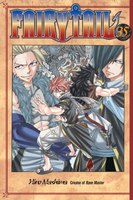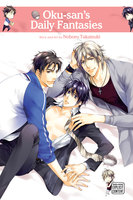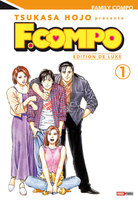RIGHT TURN ONLY!!
Tiger by the Tail
by Rebecca Silverman,

Sometimes I worry about how spending so much time with anime and manga is affecting me. Like when I watched “Flowers in the Attic” and thought, Eh, I've seen or read worse or when I wondered briefly whether Hidekaz Himaruya would make my state a girl or a boy. Then I remember how I cooked and ate periwinkles after reading The Worry Week, the persistence with which I sought out mysterious locked gardens after reading The Secret Garden, and of course my ill-fated attempt to jump off the wood bin with an umbrella after reading Mischievous Meg. So obviously my problems stem from reading in general, not in specific. Whew!

TIGER & BUNNY
Vol. 4
(by Mizuki Sakakibara, Viz, $9.99)
FROM THE BACK COVER:
Superpowered humans known as NEXT appeared in the world 45 years ago. Some of them fight crime in the city of Stern Bild while promoting their corporate sponsors on the hit show HERO TV. The people love their superheroes, even if they don't completely understand them, and not all of the NEXT use their powers for good.
The heroes face down the deranged NEXT killer, Lunatic. Lunatic's vigilantism has the city on edge, and the heroes find themselves having to convince everyone that NEXT are working for the good of Stern Bild City. Lunatic is in the wrong, but there is much more to the madman than anyone knows…
REVIEW:
And the Batman themes continue. As Kotetsu and Barnaby (and the rest of the heroes) keep fighting the mysterious new NEXT Lunatic, it is difficult not to think of Batman, especially given the weird smile on Lunatic's mask. Given that character designer Masakazu Katsura is a big fan of Bob Kane's creation, it really isn't all that surprising. That may be one of the most striking features of this volume, but Tiger & Bunny isn't just a superhero tribute – the heroes are facing a lot of negative public opinion because of Lunatic's actions, and fear is on the rise. To combat it, Kotetsu, Barnaby, and reluctant fighter Origami Cyclone are dispatched to do publicity at a school for heroes. With this, both Barnaby and Ivan (Cyclone) get to see Kotetsu as more than just an eager-for-justice goof – the strength of his convictions is impressive, and he takes on a very fatherly role, one which Barnaby outwardly rejects but can't help internalizing a bit. This helps to give Barnaby a little more personality, something he desperately needs, because he mostly still feels like the jerk to Kotetsu's nice guy. Yes, he has a tragic past that we are learning more about, but his coldness is getting old. Speaking of cold, this volume also takes time to deal with Blue Rose's crush on Kotetsu, which contrasts interestingly with the fatherly role mentioned before. This is a good volume for both action and character development, and easily one of the strongest thus far as it delves into what looks like a couple of continuing plots. Sakakibara's clean art showcases Katsura's designs but still makes them his own, and it is easy to pick this up to read a chapter and suddenly find yourself finished without realizing how much you read.
RECOMMENDATION: If you're already a fan of the series, buy it. Reading this volume is smooth and easy, and the characters are really starting to come into their own. It may not have a huge amount of substance, but it sure is fun.

DAWN OF THE ARCANA
Vol.12
(by Rei Toma, Viz, $9.99)
FROM THE BACK COVER:
Princess Nakaba of Senan is forced to marry Prince Caesar of the enemy country Belquat, tantamount to becoming a hostage. While Caesar is pleasing to the eye, he is also selfish and possessive, telling Nakaba outright: “You are my property.” With only her attendant Loki at her side, Nakaba must find a way to cope with her hostile surroundings, her fake marriage...and a mysterious power!
Princess Nakaba of Senan and Prince Caesar of Belquat only married each other for the sake of peace between their two warring countries, yet the two develop feelings for each other while political forces threaten to tear their world apart. With Caesar's departure to Belquat, the couple separates. Meanwhile, Nakaba manages to take control of Senan as ruler! But once Caesar's father, King Guran, decides to break the peace treaty and invade Senan, what will Caesar do when he's caught between his father and the woman he loves?
REVIEW:
As Shakespeare once (more or less) said, “The time is out of joint.” That may be the best way to describe the pacing in this volume of Rei Toma's political fantasy series. While the previous volume was very strong, with major reveals about Loki and Nakaba really stepping up to the plate, this book feels very rushed and not nearly as impressive as it might have been. It begins some undisclosed time after Nakaba took the Sennan throne, which we can tell by the fact that she has gone from having a bob to a mullet. Adel has totally disappeared from the scene (did Loki kill him after all?) and Belquat is getting ready to wage war. Oh, but first we have to go back in time and see why Caesar's father hates Nakaba's tribe so much. With that pesky detail cleared up, Nakaba, Loki, and Caesar abruptly team up for what is pretty much the most anti-climactic revolution in manga, followed by Loki once again reminding us why that's his name. (Those of you familiar with Norse mythology or Marvel Comics know what I mean.) The real shame is that all of this is really interesting stuff, and had Toma devoted more time to each segment (barring the past), this could have been a much better sequence of events. As it stands, however, this is a real let-down after volume eleven, and some less than stellar artwork doesn't help. Yes, horses are hard to draw, but Toma's are particularly unfortunate this time around, and many of the men are suddenly sporting lithe and girlish figures. Dawn of the Arcana hasn't always been perfect, but it has consistently been better than this.
RECOMMENDATION: Borrow it from a library or a friend. This may seem silly given that some of you have been collecting the series and it is almost finished, but if you haven't yet, this volume makes a strong argument for not starting and just going the library route.

FAIRY TAIL
Vol. 35
(by Hiro Mashima, Kodansha, $10.99)
FROM THE BACK COVER:
DRAGON SLAYER DEATHMATCH When Minerva of Saber Tooth sadistically thrashes Lucy to within an inch of her life, Fairy Tail vows vengeance! Their chance comes at the climax of the fourth day's events. It's Natsu and Gajeel vs. Sting and Rogue, the old dragon slayers against the new! Can the stadium contain the sheer power of these wizards' fire and iron?
REVIEW:
The Grand Magic Games have been dragging on for quite a few volumes now, and readers who are not fans of tournament arcs could be forgiven for getting a bit sick of the whole thing. That's why this latest volume comes a something of a surprise – not only is it good, it's compulsively good: I planned to read the first two chapters before bed and ended up finishing it in one sitting, despite exhaustion. Partly this is because after Minerva's cruel abuse of Lucy in the previous volume, we are all ready to see Fairy Tail beat the crap out of Raven Tail, and when Natsu and Gajeel are paired off against the two 3rd generation dragonslayers, you just know that that's about to happen. Or is it? Mashima manages to turn a very basic “x vs y” battle into an edge-of-your-seat string of chapters filled with escalating violence and increasingly crazy levels of power. This is nicely interspersed with images of Lucy recovering, just to remind you what the motivation behind this is. Add to that Mystogan's pursuit of the mysterious mage with the Zeref-like powers, the nearly complete plot the government is working on, and Levy's increasingly distraught (and ominous) narration, and this is the best volume in the arc.
Sadly, after the massive nail-biting ending of the main story, Mashima throws in two fluff chapters, which is a serious let down. Not that the side story about everyone hanging out at the pool is bad – it's actually pretty funny and has some moments for the Erza/Jellal fans – and the wordless story that follows it is impressive in its use of art to communicate a complete plot, but to go there after leaving us on the brink of something major really pulls things down. Images of Ichiya in a speedo with an all-too-visible man bulge are also less than lovely, although watching the audience vomit after seeing it almost makes it worthwhile.
RECOMMENDATION: Unless you've given up on the series, buy it. This volume is really tense and beats its predecessors; it is far more enjoyable than it ought to be. If you've let Fairy Tail go, borrow up through this point – it may renew your interest.

VOICE OVER! SEIYU ACADEMY
Vol. 4
(by Maki Minami, Viz, $9.99)
FROM THE BACK COVER: Hime Kino's dream is to one day do voice acting like her hero Sakura Aoyama from the Lovely ? Blazer anime, and getting accepted to the prestigious Holly Academy's voice actor department is the first step in the right direction! But Hime's gruff voice has earned her the scorn of teachers and students alike. Hime will not let that stand unchallenged. She'll show everyone that she is too a voice acting princess, whether they like it or not!!
After days of grueling training at Yamada's special voice acting retreat, Hime can finally bring forth her prince voice! Now she's ready to start her next job as a recurring character in an exciting new anime. But her first day on the set doesn't go as she'd hoped. Why do her costars and the producers seem to hate her when they just met her?!
REVIEW:
Now that Hime, as “Shiro,” has mastered her prince voice, she's pretty sure there's nothing to stop her from voice actor stardom...except that she seems to have forgotten about that “actor” part. While that may feel a little goofy to readers, we can also understand how she got confused – after all, up to this point the entire series has been about making her voice sound good, not her acting abilities. Now that Minami's brought that to the fore, however, she makes it work, mostly through her use of crazy cat gentleman and ostensible male protagonist Senri Kudo. Senri is the ultimate tsundere, hiding all his warm, gooey feelings behind a mask of pure evil (slight exaggeration), only really able to admit his softer side to or through his cats. And Minami's good with the cats – the move like real cats, have recognizable feline personalities, and wreak havoc in a very believable way. This actually turns out to be a major plot point, too, so this it isn't just there for the cat fanatics to coo over. Only problem is is that Senri really doesn't feel like the romantic interest, or even the male lead. The chemistry between Hime and upperclassman Mizuki is much more tangible, and Mizuki also appears to have much more invested in the relationship than Senri does with “Shiro.” To be fair, Mizuki also knows a lot more of what's going on and it is part of Senri's character that he doesn't emote well, but at four volumes in, the author shouldn't have to keep telling us that Senri's the hero. Minami also relies a little too heavily on using shadowed lines over faces to give us the characters' emotions, and generally there appear to be about three basic facial expressions everyone uses. Fortunately the story and the rest of the art is dynamic enough to keep that from being a major detriment – Minami's use of body language is strong, which definitely helps. With Hime going through almost every emotion in the book, this volume has a lot of storytelling despite not a lot of physical action, it's easy to overlook the faults and just get caught up in the story.
RECOMMENDATION: Buy it. Voice Over is not only a good story, but it's also a shoujo title that revolves less around romance and more around the heroine's goals as a person, so even if you're not a fan of shoujo in general, this is worth checking out. Plus Hime's various horror voices are really pretty funny.

FROM THE NEW WORLD
Vol. 3
(by Yusuke Kishi and Toru Oikawa, Vertical, $10.95)
FROM THE BACK COVER:
Saki and friends finally learn many of the troubling secrets of their brave new world. Whether the harsh facts can be altered or not is another matter altogether.
REVIEW:
While it has become the norm to refer to all dystopias as “brave new worlds,” many forget the second half of the line - “that has such people in't!” In the case of From the New World, that's an important group of words. As Saki and her friends quickly realize that something is very amiss in their memories, they set out to find the answers Shun told Saki about before his death. What they find sheds a lot of light on why their world operates the way it does, and to say that it's horrifying is putting it mildly. While what we see is disturbing, the actions of the adults is far, far worse, as is the way they justify everything. It's awful because on a level it all makes perfect sense...until you hear what they'd originally planned for Group 1. How anyone can be so callous is a large part of what sets Saki and her friends apart from the others in their world, and maintaining that sense of social justice could make or break the protagonists. Maria gets the most real character development in this volume, and her actions determine the course of the series just as much as Saki's do, albeit in a different way. Mamoru and Satoru feel a bit like followers right now, but it looks as if that's set to change. Really, the major issue here is still with the artwork, which is still oversexualized to a point where it is sometimes difficult to take the story as seriously as it deserves. There's one last fairly explicit lesbian sex scene (which is kind of explained, or at least the attitude towards underage sexuality is), but then most of the fanservice is the girls' clothes. Wondering how Saki's pants stay up is almost as tense as guessing what's going to happen next...
RECOMMENDATION: If you aren't turned off by the art, buy it. This is science fiction at its best, with believable (yet despicable) actions, a drive to change the world, and a few warnings about the future thrown in. If you aren't sure if you can deal with the sexualization, still borrow this from a library or a friend. It really is worth reading.
DIGITAL SPOTLIGHT

OKU-SAN'S DAILY FANTASIES
Vol. 1
(by Noboru Takatsuki, SuBLime, $5.99)
FROM SUBLIME:
Oku-san is a normal office worker who has one joy in life, to fantasize about his local deliveryman, Sudo-kun. To feed his fantasies and his desire to see Sudo-kun, Oku-san habitually shops online filling his room with useless and sometimes very erotic things. It's all pretty harmless until one day his neighbor Yokoshima finds out about his secret hobby. Caught between two hot guys—at least in his mind—will Oku-san be able to fantasize his way out of this one?
REVIEW:
Our story centers on Yuzuro Oku, the titular “Oku-san,” a play on the word for “housewife.” Oku is a 26-year-old office worker who has fallen in love with Riki Sudo, a deliveryman whose route takes him to Oku's door. Ever since Sudo delivered a package, Oku has fantasized about the day when he would bring a mail order box to his door and then stay to deliver a very different “package.” The only problem? Oku has yet to tell Sudo how he feels and as far as the object of his lust is concerned, Oku's just a guy who buys a lot of stuff online. None of this can curtail Oku's wild imagination, however, and his sexual curiosity eventually leads him to order adult goods from a website. This not only lands him with a dildo he names “Sudo-kun,” it also garners the attention of Yokoshima, his next door neighbor. Yokoshima, it turns out, works for a company that makes and distributes sex toys, and he processed Oku's order. Yokoshima decides to be “helpful” and begins giving Oku a variety of free toys and lotions to try out, generally by climbing in through his balcony.
The humor factor is high in this story. Takatsuki, the illustrator for June's All You Need is Love novels, pokes fun at all manner of yaoi (and hentai, for that matter) tropes as Oku fantasizes, lampooning such genre fetishes as “mangaka in need of inspiration,” “feudal lord and retainer,” and “furry cosplay,” while also making fun of the costumed hero, sex on the beach, and prison lovin'. Since these are all Oku's daydreams, everything is assumed to be consensual, which in some scenarios is a nice change. Lines sometimes are cheesy in a deliberate way, such as in one fantasy after Sudo has delivered organic sausage and (in Oku's feverish mind) he asks, “Which do you want? The additive-free sausage, or my sausage?” Underneath the fantasies is a story about Oku's feelings and a slowly building romance plot which is satisfactorily wrapped up at the volume's end. There is an underlying theme of “love” versus “lust” wending its way through the narrative, and this almost-invisible emotional core ultimately makes the book worth reading as a complete story.
RECOMMENDATION: This one is absolutely worth reading if you like a funny romance. I'd say that those who aren't generally fans of yaoi could also enjoy it, especially if you enjoy the Yuki Yoshihara or Maki Enjoji school of humor. Since SuBLime offers download-to-own files, there's no danger of losing the book should the site disappear.
UNTRANSLATED GEM

F. Compo
14 Volumes
(by Tsukasa Hojo, price and publisher vary by country)
FROM THE ENCYCLOPEDIA:
Masahiko Yanagiba lost both parents and, following his mother's will, moved to his maternal uncle's family, the Wakanaes. Although Wakanaes' hospitality was heartwarming, he soon found out why his other relatives shun away from the Wakanaes: his "uncle" is a woman while his "aunt" is just the opposite. Turns out the couple took the appearance of the opposite gender, and now Masahiko has no idea whether his cute cousin, Shion Wakanae, is either a boy or a girl.
REVIEW:
Tsukasa Hojo has been pretty well overlooked by English language publishers, which is really a shame. He's much more than just City Hunter or Cat's Eye, with a lot of sweeter stories to his name than many realize. Of his works, one of the most interesting is F. Compo, a fourteen volume series that ran from 1996 to 2000. The story is about Masahiko, a young man who has been recently orphaned. His mother's will specified that he was to be taken care of by her brother, but when the man in question shows up, he appears to be a woman. It soon becomes evident that Yukari is transgender, as is her husband, Sora. Masahiko has never encountered anyone like them before (and it's not even clear if he's ever heard the term “transgender”), and is pretty freaked out by the whole situation. This becomes even more of an issue for him when he realizes that pretty cousin Shion has been raised as both a boy and a girl, her gender alternating by year. Currently Shion is female...but is that her biological gender?
While F. Compo is not as sensitive as a more contemporary portrayal of a transgender couple might be, Hojo still handles things very well: in one striking scene in an early volume, Masahiko insists that his aunt and uncle come to school dressed as their biological genders, and their obvious discomfort shames him into realizing that this is not a “choice,” but an actual necessity for them, which has an impact on how he treats them and thinks of them from that point on. This almost excuses that Shion's gender fluidity is played for laughs, and really, when you get right down to it, F. Compo is a product of a less understanding time and really stands out as a story that tries very hard. Just as importantly, it's very enjoyable, and if you go in knowing that it's no Wandering Son, it's a good read...and probably an important series in the LBGTQ timeline.
DON'T WORRY! READ IT IN: French, Spanish,
That's all for this time! Has a book (manga or otherwise) ever inspired you to do something weird? Tell us in the forums, and join me again next RTO when I'll be up to my elbows in matzo ball batter and brisket! Ah, Jewish Girl Problems...
discuss this in the forum (22 posts) |